Are you on the hunt for the best crypto wallets of 2023? Look no further! With so many options to choose from, it can be overwhelming to find the right one for your digital assets.
That’s why we’ve done the research for you and compiled a list of the top crypto wallets to keep your bitcoins, ethers, and other cryptocurrencies safe and secure in the upcoming year.
From hardware wallets to software wallets, we’ve got you covered. Read on to find the perfect wallet to fit your needs.
Key Takeaways:
- Trust Wallet is the best Software Wallet
- Metamask is the best Browser Extension for Wallet
- SafePal and ELLIPAL Titan are the most secure Hardware wallets
- Ledger Stax is the best cold wallet for user experience and Touch screen display
We Recommend: Best Software Wallets
Choose Security over Convenience

Best 3FA Non-custodial wallet
- No seed phrase vulnerability, powered by MPC
- A guaranteed wallet recovery model
- Built-in
Web3 firewall

Best Custodial wallet (100% Solvent)
- 800+ coins and tokens
- Copy trading and bots
- Automatic Trading Strategies
- Staking APY up to 130%
List of Top 8 Best Crypto Wallets in 2023
Here is the list of the best crypto wallets in 2023 for storing your cryptocurrencies-
- Trust wallet: Best Crypto wallet for Mobile users
- Metamask: Best Ethereum Blockchain crypto wallet
- Coinbase wallet: Best Bitcoin wallet
- Exodus: Best crypto wallet for desktop users
- Ledger: Best cold storage wallet
- Trezor: Top Hardware wallet for high security
- SafePal: Both Hardware and Software wallet
- ELLIPAL Titan: 100% air-gapped crypto cold wallet
Comparison between Best Crypto Wallets
| Type of wallet | Best crypto exchange wallet | Best cold storage wallet | Best for security | Best for desktop users | Best for mobile users |
|---|---|---|---|---|---|
| Wallet | Coinbase wallet | Trezor Model T | Ledger Nano X | Exodus | Trust wallet |
| Pricing | Free | $200 | $120 | Free | Free |
| Type | Hot wallet | Cold wallet | Cold wallet | Hot wallet | Hot wallet |
| Android and IOS version | Yes | Connect with the mobile app | Connect with the mobile app | Connect with the mobile app | Yes |
| Supported currencies | 10,000+ | 1,500+ | 5,500+ | 100+ | 4.5M+ |
1. Trust wallet: Best software mobile wallet
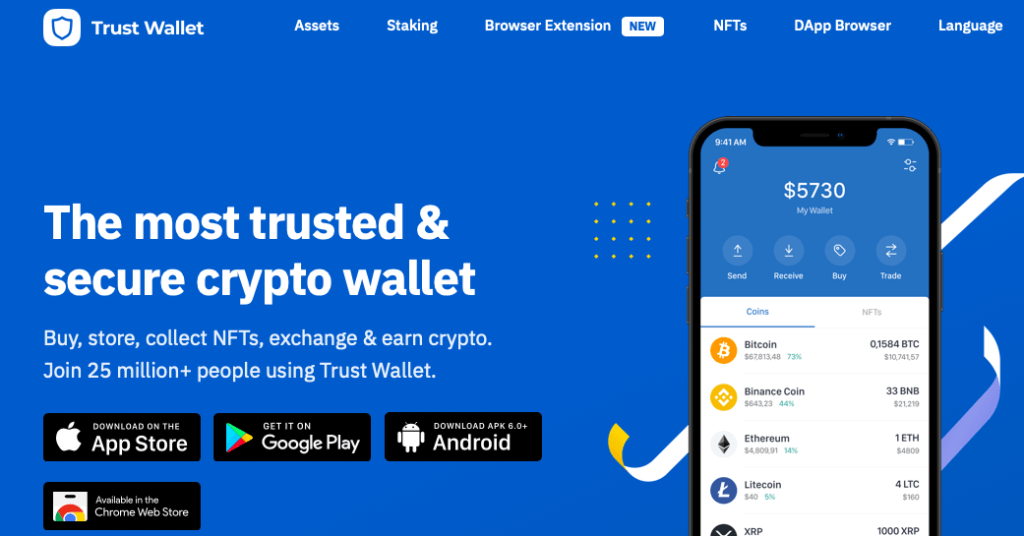
Trust Wallet supports all kinds of cryptocurrencies with 54+ supported blockchain networks. It has high security with two-factor authentication and 2FA like Google authenticator, SMS, or email.
It is one most downloaded crypto wallets in the Google play store. You can also directly purchase cryptocurrencies using the trust wallet credit card system. Trust Wallet is very convenient and user-friendly.
Trust wallet can be the best Bitcoin wallet for long-term holders and earn staking rewards on their BTC Storage.
Key Features of Trust Wallet
- Binance acquired the company in 2018 since it is a BSC blockchain wallet
- DApps supports
- NFTs can be stored and minted by connecting to marketplaces
- It also supports Credit card
- Price tracking and daily interest are also available
- Credit cards and debit cards supported
- More than 4.5M+ assets supported
- The app supports 65 blockchains
- Trust Wallet supports all popular cryptocurrencies including Bitcoin and Alternate Coins (Altcoins) like Ethereum, AVAX, Cardano, ripple, dogecoin, etc.
Private Key: 12-word seed phrase
Pros and Cons of Trust Wallet
| Pros | Cons |
|---|---|
| Free to use | Limited customer support |
| Supports a wide range of cryptocurrencies | Limited fiat currency support |
| Easy-to-use interface | No web or desktop version |
| Offers decentralized exchange integration | |
| Supports staking and DeFi protocols | |
| Allows users to create and import multiple wallets |
2. Coinbase wallet: Best Bitcoin wallet
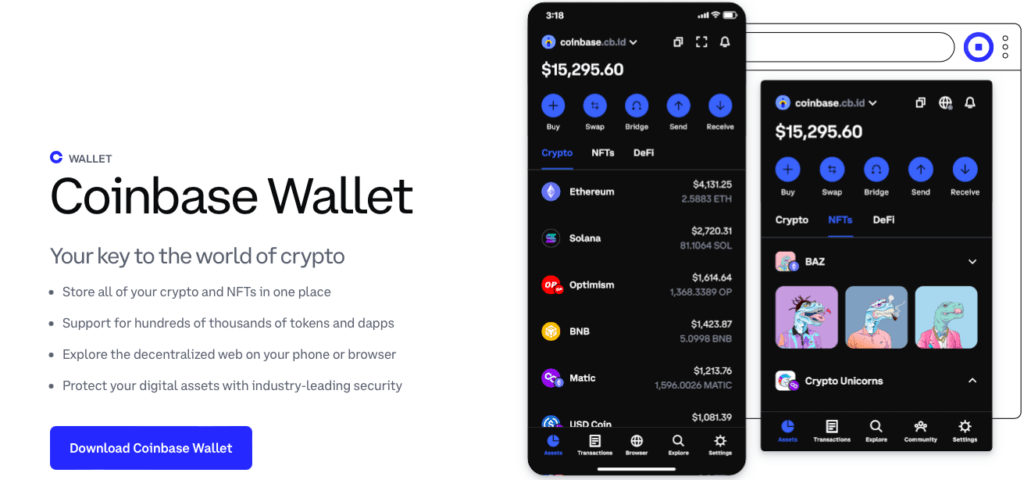
Coinbase wallet is easy to use and seems to be a very secure and efficient way to invest/trade in the top cryptocurrencies. It is one of the best crypto storage software wallets which is operated by US-based exchange Coinbase pro. It supports 600+ crypto assets, very convenient and user-friendly.
Wallet initially only supported Bitcoin and Ethereum, but it almost supports everything today. The list right now includes Ethereum, Solana, Cardano, Luna, and many more.
They’ve also clarified that more currencies and blockchain support will be available soon.
Features of Coinbase wallet:
- Provides biometric verification using the Protected Enclave chip included in Android, iOS, iPad, and Macintosh devices.
- In-app connection to decentralized platforms that can transfer assets without the need for a third party
- Cloud backups are an option for safeguarding your encryption keys.
- Easily send and receive bitcoin and another crypto
Pros & Cons of using coinbase wallet
| Pros | Cons |
|---|---|
| User Friendly | fewer crypto assets supported |
| free of cost | Desktop app not available |
| backed by a top crypto exchange (Coinbase US) | |
| High security | |
| Use as a chrome extension for easy integration |
Must Read: Coinbase wallet vs Trust wallet
3. Metamask: Best browser extension digital wallet
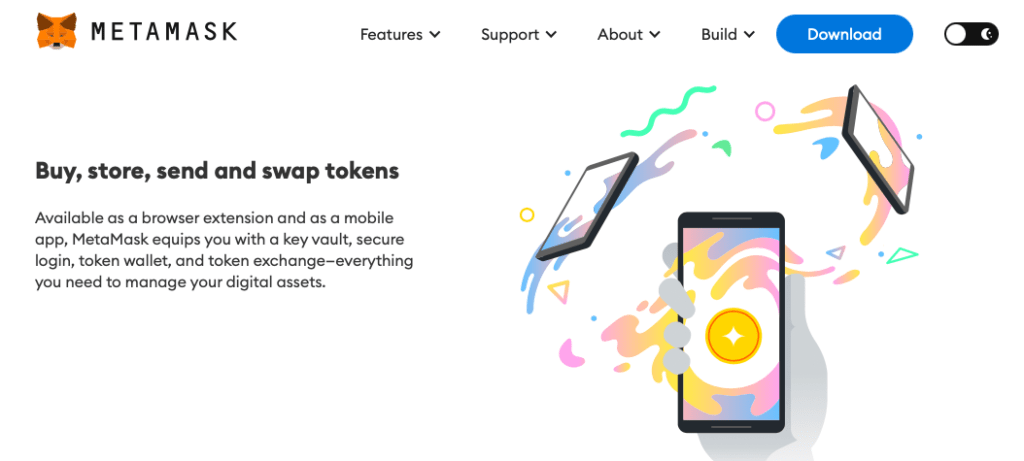
Metamask is a popular cryptocurrency wallet that is designed to help users interact with decentralized applications (dApps) on the Ethereum blockchain. It is a browser extension that can be added to Chrome, Firefox, and Brave browsers, as well as a mobile app that can be downloaded for iOS and Android devices.
Metamask wallet allows users to securely store, manage, and transfer cryptocurrencies such as Ether (ETH), ERC-20 tokens, and other ERC tokens. It also acts as a bridge between the user’s web browser and the Ethereum blockchain, allowing them to interact with dApps and sign transactions without the need to manually enter their private keys or seed phrases.
Metamask is the most used browser extension wallet in NFT Marketplaces like OpenSea, Looks rare, Rarible, etc. It can easily transfer your crypto assets from one address to another.
It supports all decentralized apps DApps, including Uniswap, Pancakeswap, and NFT marketplaces based on the Ethereum blockchain.
Key Features of metamask
- Chrome and Firefox extensions are available
- Erc-20 network token transfer available
- password and key phrases available as a high-security guard
- convenient user interface
- Easily stores NFTs and collectibles
Pros & Cons of using Metamask wallet
| Pros | Cons |
|---|---|
| Decentralized | only supports ERC-20 tokens |
| Private keys and password protected | online wallet not offline |
| user friendly | high transaction fees |
| Connect with Ethereum-based networks |
4. Exodus: Best crypto wallet for Desktop

Exodus wallet is a popular cryptocurrency wallet that enables users to securely store, manage, and exchange various cryptocurrencies. Launched in 2015, the Exodus wallet has become a go-to option for many cryptocurrency enthusiasts due to its user-friendly interface, advanced security features, and support for multiple digital assets.
Exodus has built-in exchange functionality, which allows users to quickly and easily exchange one cryptocurrency for another within the wallet. This is particularly useful for traders who want to move funds between different assets without having to use external exchanges.
Exodus also provides users with advanced security features such as two-factor authentication, biometric authentication, and encryption. This ensures that users’ private keys and other sensitive information are protected from unauthorized access.
It is user-friendly and supports the transfer of all top crypto assets.
- Both desktop and mobile users can use
- Built-in ShapeShift
- Auto fee adjustment features
- 24/7 customer support
- 200+ crypto assets
Features of exodus wallet
- Fees can be adjusted, but only for Bitcoin transactions.
- A rising number of applications for live charting, crypto holdings, and cryptocurrency transfers have been created to expand the wallet’s capabilities.
- To allow faster payments, it operates on a light client, which means it employs SPV and doesn’t download whole blockchains.
- purchase crypto with credit and debit cards
Pros & Cons of using Exodus wallet
| Pros | Cons |
|---|---|
| Over 150+ cryptocurrencies are supported. | High transaction fees for ERC-20 network |
| Trezor One and Trezor T cold storage wallets are supported. | Multi-signature support is not applicable |
| Apple pay is supported | |
| connect with top exchanges | |
| User-friendly and easy navigation |
Also Read: Exodus vs Atomic wallet
5. Ledger: Best hardware wallet with Bluetooth
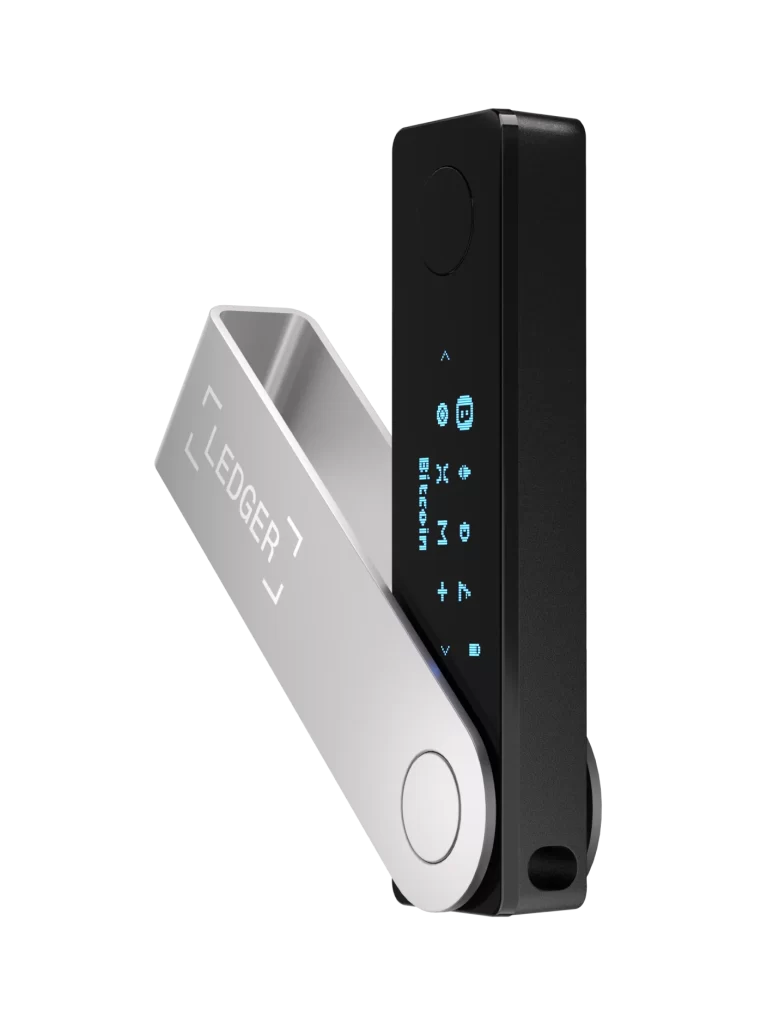
Best crypto wallet for long-term holders.
A ledger is a hardware wallet or cold wallet. The Ledger Nano X and Ledger Nano S are both packed into convenient form factors, including micro-LCD. It is one of the best on the cold wallets list.
One thing I don’t like about a ledger is its Bluetooth functions as we all know how dangerous Bluetooth services can be in terms of security and accessibility.
The Secured Component chip from Ledger is a specialized device that safeguards against numerous forms of cyberattacks and is also utilized in highly secured alternatives like credit card payments and ids.
Features of ledger wallet
- Bluetooth-enabled wallet
- Ledger Live App for easy buying and selling
- high security (not connected to the internet)
- Decentralized apps supported
- around 5000+ crypto assets support
- The Ledger Live application will be used to loan and stake crypto to make money in addition to purchasing and trading it.
Pros & Cons of using ledger cold storage
| Pros | Cons |
|---|---|
| It can handle a high volume of crypto assets. | costly |
| Trading via the Ledger Live smartphone application is possible thanks to Bluetooth. | difficult to trade for a novice |
| 7-hour hardware battery life | |
| high security of private keys and funds |
Read: Ledger Stax: The premium Hardware wallet
6. Trezor: Top cold storage digital wallet
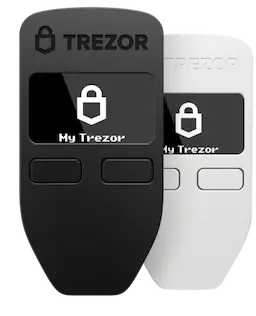
Trezor is small USB-connected hardware that links to your computer. It is offline (cold wallet) and enables you to verify transactions (i.e., validate your private keys) without having access to the network.
Trezor devices include strong security features like PINs and seed phrases that make them virtually hard to breach. Satoshi Labs has sold almost 1 million Trezor wallets, making them extremely prominent within the crypto community.
Types of Trezor devices: the Trezor One and the Trezor T.
Private Key: 24-word seed phrase
Trezor one
Trezor One was released in 2014. It remains one of the best wallets on the market. This could be the superior alternative for premium crypto investors. If you just want the ultimate wallet SatoshiLabs has to provide, you’ll have to go with the Trezor Model T.
Trezor T
The Model T, which debuted in 2018, is the second version of the Trezor One and includes most of the Trezor One’s functionality with a few tweaks.
- Additional cryptos, like XML and ADA, are supported by the Model T.
- New device functionality, such as a Micro sd port, is included.
- A new RGB color capacitive touchscreen is included with the Model T.
- Only the Model T has access to Shamir backup, an enhanced decentralized seed.
Read Full Guide: Trezor vs Ledger
Key Features of Trezor
- It supports multiple cryptocurrencies, including Bitcoin, Ethereum, and Litecoin.
- It has a small OLED screen for displaying transaction information and a physical button for confirming transactions.
- Trezor uses advanced security features, such as password protection and a seed recovery phrase, to secure the stored cryptocurrency.
- It also supports integration with various web wallets and software wallets for convenient access to stored cryptocurrency.
- The firmware can be fully audited as it is open-sourced.
- Compatible with popular wallets like MyEtherWallet, Exodus, and Trust wallet.
Pros and Cons of Trezor
| Pros | Cons |
|---|---|
| Security and Physical Wallet. | Physical device – Requires possession. |
| Compatibility with various crypto and wallets | Higher cost compared to software wallets. |
| User-friendly interface. | Need an online device to access it. |
| Open-source | Recovery phrases need safekeeping. |
7. SafePal: Best Hot and Cold Wallets Combo

Safepal is a hardware wallet designed for storing and managing cryptocurrencies. It was launched in 2019 by the Safepal team, a subsidiary of Binance, one of the largest cryptocurrency exchanges in the world.
The Safepal wallet is a compact and portable device that allows users to securely store and manage their crypto assets offline. It is equipped with advanced security features, such as a secure chip and a touch screen, which help prevent unauthorized access and protect against hacking attacks.
One of the key features of the Safepal wallet is its ease of use. It is designed to be user-friendly, even for people who are new to cryptocurrency. The wallet supports a wide range of cryptocurrencies, including Bitcoin, Ethereum, Binance Coin, and many others.
It also allows users to easily manage their assets through the Safepal mobile wallet, which is available for both iOS and Android devices.
Must Read: Ledger vs SafePal: Which should You choose
Key Features of SafePal
- It’s easy to use and has a user-friendly interface.
- Safepal supports a wide range of cryptocurrencies.
- It’s portable and compatible with various devices.
- Anti-temper and Self-destruction
- It offers a backup and recovery feature to protect against loss or theft.
Pros and Cons of SafePal
| Pros | Cons |
|---|---|
| Supports multiple cryptocurrencies | No Bluetooth |
| Easy-to-use interface | No multi-signature feature |
| Supports both mobile and desktop | Not all blockchains supported |
| Offers built-in DEX and NFT marketplace | |
| Strong security features |
8. ELLIPAL Titan: Air-gapped Cold Wallet

The Ellipal Titan wallet is a hardware wallet designed for securely storing cryptocurrency. It features a large touch screen and a completely air-gapped design, meaning that it is not connected to the internet and cannot be hacked remotely.
The device supports a wide variety of cryptocurrencies, including Bitcoin, Ethereum, Litecoin, and more, and can be managed through the Ellipal mobile app.
Additionally, the Ellipal Titan wallet features a durable and waterproof design, making it a reliable option for cryptocurrency holders who prioritize security and convenience.
Key Features of ELLIPAL Titan
- It has a large, 4-inch touchscreen display for easy navigation and use.
- The device is built to withstand physical damage and has a durable, metal casing.
- Ellipal Titan features multi-signature support, allowing for increased security and access control for shared accounts.
- The device uses a passphrase for added security, ensuring only you have access to your funds.
Check This Out: ELLIPAL vs SafePal: Which is better
Pros and Cons of Ellipal
| Pros | Cons |
|---|---|
| Large Touchscreen | High Cost |
| Offline Storage | Limited Coin Support |
| Sturdy Design | Limited Third-Party Integration |
| Easy to Use | |
| High-Level Security |
What is a Crypto wallet?
A crypto wallet is a digital tool that allows you to interact with the blockchain network and store your cryptocurrencies securely.
It is a software program that generates and manages public and private keys, which are essentially long strings of characters that allow you to send and receive cryptocurrencies.
Public keys are like your bank account number, which you can share with others to receive funds. Private keys, on the other hand, are like your PIN or password, which you need to keep confidential and secure, as they are used to sign transactions and give you access to your funds.
Types of crypto wallets
There are two types of wallets known software wallets and hardware wallets.
1. Software wallets
Software wallets are web wallets, mobile wallets, or desktop extension wallets that are operated using private keys. For example, Metamask, Trust Wallet, Phantom wallet, etc. are software wallets that can be found on the google play store.
2. Hardware wallets
Hardware wallets and physical devices act like cold storage for confidential keys. The passwords are protected by a PIN, making it difficult for hackers to extract private keys as it is an offline wallet and operated as a plug-in device.
Hardware wallets are said to be very convenient and user-friendly as they can be connected to any crypto exchanges to complete transactions else they are not connected to the internet.
Quick Tip: When confirming a crypto transaction, always make sure you’re sending to an address for a wallet of the same type of network. If you send Solana SOL to a Cardano (ADA) address, for example, those funds will be lost in the blockchain and can not be retracted.
3. Custodial Crypto wallets
The main concept is that you give away your cryptocurrencies to a 3rd party to be safeguarded rather than handling the cash yourself.
Custodial wallets are frequently referred to as Bitcoin banks since they remove third-party from the banking markets, which is a clear feature of this platform and outlined in the initial Bitcoin white paper.
Why custodian wallet is best?
- If internet security isn’t your greatest strength, you might be best off handing your crypto to a 3rd party.
- A third-party custodian can assist you in ensuring that you have control of your assets.
- If you just want to operate on the most prominent bitcoin exchanges, you’ll need a custody wallet.
- You can earn high staking rewards using custodian services from exchanges.
4. Non-Custodian Crypto Wallets
A non-custodial wallet is a simple software that runs as an extension on a desktop or app on a cell phone and gives you complete management over your bitcoin assets.
No one else can perform a transaction on your behalf since you have your private keys. With increased power, though, comes greater responsibility.
Software Wallets vs Hardware Wallets
| Feature | Cold Wallet | Hot Wallet |
|---|---|---|
| Security | High | Moderate |
| Private Keys | Stored Offline | Stored Online |
| Ease of Use | Moderate | Easy |
| Compatibility | Limited to Supported Platforms | Wide |
| Mobility | Limited | Highly Mobile |
| Backup and Recovery | Typically Manual | Typically Automatic |
| Cost | Moderate to High | Free to Moderate |
| Transaction Fees | Typically Lower | Typically Higher |
| Multicurrency Support | Limited | Wide |
| Community Support | Limited | Wide |
| Access to Funds | Requires Device | Requires Internet Connection and Credentials |
| Ownership and Control | Full Ownership and Control of Private Keys | Partial Ownership and Control of Private Keys |
| Offline Transaction Signing | Yes | No |
| Phishing and Malware Risks | Very Low | Moderate |
How Do I use a crypto wallet?
Cryptocurrency wallets are digital wallets where you may store your virtual cash. You can store Bitcoin, Ether, Solana, and polkadot in your Cryptocurrency wallet just like you can put dollars in a physical wallet.
Some of the wallets on this list have a digital framework for buying and selling cryptocurrencies. Others are just designed for storage. Keeping your cryptocurrency online or in an offline wallet has advantages and disadvantages.
It’s better to determine the best wallets with security and convenience for your specific demands and comfort.
Pros and Cons of Using Cryptocurrency Wallet
Pros
- Bitcoin and other virtual currencies are kept in a secure environment.
- Some wallets can purchase and sell coins to profit from market changes.
- You have the option of keeping your money public and accessible, or private and extremely secure.
Cons
- Some of the platforms linked to these wallets have exorbitant fees.
- Some wallets might be difficult to set up,
- Most cold storage wallets have an initial investment
How to choose the best crypto wallet?
- The total number of cryptocurrencies supported
- Security and scalability
- Type of wallet, hot or cold wallet
- Pricing and features
- Best customer support
When choosing a best crypto wallet, it’s important to consider a few key factors. First and foremost, you want to make sure the wallet is secure and provides the level of security you’re comfortable with.
This might include two-factor authentication, a secure password, and other measures to protect your funds. You should also consider the user experience, as well as the range of cryptocurrencies the wallet supports.
Additionally, it’s a good idea to choose a wallet that has a good reputation and is well-established in the crypto community.
How to store the Private Keys of a crypto wallet?
There are a few different ways to store the private keys of a crypto wallet, and the method you choose will depend on your personal preferences and the type of wallet you are using. Here are a few options:
- Write down the private key on a piece of paper and store it in a secure location, such as a safe or a bank vault. This is known as a “paper wallet” and is considered one of the most secure ways to store private keys.
- Use a hardware wallet, such as a Trezor or Ledger Nano. These are specialized devices that are designed to securely store private keys and protect them from being stolen or hacked.
- Use a software wallet on your computer or mobile device, and make sure to use a strong password to protect it. Some software wallets also allow you to create multiple backups of your private keys, which can be stored in different locations in case one of them is lost or stolen.
- Use cryptoTag Zeus for a platinum plate hardware backup of your keys.
Final Thoughts
Best Crypto wallets are necessary for anyone who utilizes digital money. We examined over twelve different digital wallets to get this list of the best options.
We considered cost, security, convenience of usage, and features useful to regular cryptocurrency users while selecting the best cryptocurrency wallet.
FAQ
How does the crypto wallet work?
A crypto wallet is essentially a digital wallet that allows you to manage your cryptocurrencies. When you create a crypto wallet, it generates a unique pair of public and private keys that you can use to access your cryptocurrencies. The public key is like your account number, and it is what you give to others so they can send you cryptocurrencies. The private key is like your password, and it is what you use to access your cryptocurrencies and conduct transactions on the blockchain.
What happens when your store crypto in wallets?
When you store your cryptocurrencies in a wallet, you are essentially storing the private and public keys that give you access to your cryptocurrencies on the blockchain. This allows you to easily access and manage your cryptocurrencies, as well as conduct transactions on the blockchain.
It’s important to keep in mind that when you store your cryptocurrencies in a wallet, you are ultimately responsible for keeping your private key safe. If someone else gains access to your private key, they can potentially steal your cryptocurrencies. That’s why it’s important to choose a secure and reputable wallet and to take steps to protect your private key, such as by using a strong password and keeping it in a safe place.


